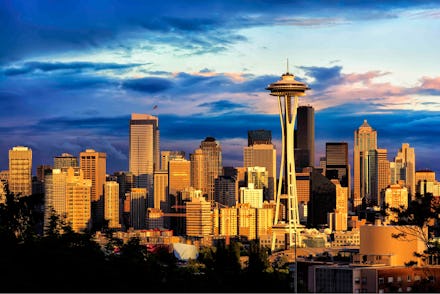6 Months Since Legalizing Pot, Washington Looks Very Different Than Colorado

The news: Almost half a year into Colorado's retail marijuana legalization program, and it's going basically as intended. Crime is down (though there's no evidence legalization is responsible), sales are on track to generate tens of millions of dollars in taxes, and the doom-laden prophecies of marijuana reform opponents don't seem to have materialized ... yet. We are still awaiting more hard data, but the sky isn't yet falling and the regulatory environment is responding to new developments — especially with potent marijuana edibles that anecdotally seem way too strong for amateurs.
So how's it going in Washington, the other state to legalize the sale of marijuana for recreational use this year?
As it turns out, not so hot — in fact, it hasn't really begun, mainly because the state hasn't moved quickly enough to set up a regulatory environment or a network of marijuana dispensaries. Colorado's network of medical marijuana dispensaries laid the groundwork for a bustling recreational sales industry. But in Washington, customers are still waiting for legal businesses that can sell marijuana.
The background: Reason's Jacob Sullum has an extensive rundown of the case for why Washington is off to a bad start, and it's pretty compelling ("Soviet-style" aspersions aside). The state's Liquor Control Board (LCB) has long been skeptical of the legality of medical marijuana dispensaries, most of which operated as "collective gardens" with rotating memberships. Even in permissive Washington, the legal basis behind these businesses was stretching it (though few prosecutors would bet on a Seattle jury convicting a medical marijuana provider). Restrictions introduced in the I-502 proposal that legalized recreational marijuana, coupled with the LCB's restrictive attitude towards marijuana, meant that medical marijuana patients could end up thrown under the bus.
For what it's worth, the LCB doesn't know what the demand will be, relying on a RAND corporation survey that indicated use more than double previous estimates. Unlike in Colorado, there's a cap on the amount of legal weed that can be grown statewide: 80 tons. The RAND survey estimates that Washingtonians smoked an astounding 175 tons of the green stuff in 2013, meaning state-licensed stores won't be able to keep up with demand and prices will skyrocket.
The LCB is planning to issue around 334 retail licenses for the entire state (around the same number of state-owned liquor stores before privatization in 2012), but no one knows how many of those will ever actually open in the near future. Some 100 cities and counties have temporary or permanent bans on marijuana businesses, and lawsuits are currently ongoing to see whether these bans are legal under state law. As of May 6, just 29 production licenses had been issued.
And the LCB wants to restrict supply to ease the concerns of the feds, meaning that prices will be high. It has no illusions that it will immediately wipe out the illegal marijuana trade. Instead, the LCB hopes to capture 25% of the total market in the first year of operation, which could go in either direction, depending on prices and availability.
"I don't know how quickly people moved away from buying their liquor from bootleggers after Prohibition ended," said John Schochet, who works for the Seattle City Attorney's Office. "But I think we start from the view that most people, given a reasonable, legal way to purchase a product, will take the legal way if it's not outrageously expensive and inconvenient. We would like to be more ambitious than the 25% figure."
Adding to its problems, Washington currently has no locations where recreational marijuana can be legally purchased. And it won't until at least July.
The (University of Washington) Daily's Nathan Taft writes: "Lawmakers are concerned that allowing unlimited marijuana growth in the new system will result in more illicit sales, but that couldn't be further from the truth. There already is unlimited marijuana growth — it just occurs in the black market. Let's put that growth where it belongs, in legal marijuana farms that are taxed, regulated and far away from minors."
So is this really a huge mess? No, Washington's bill remains a huge step in the right direction. Its regime will just be less liberal and more cautious than Colorado's. While that means it might not have the same immediate, major impact, it also means that Washington's marijuana industry will be more tightly regulated. Free market advocates will be frustrated by the slower pace of reform in Washington, but it's just one of several regulatory regimes that will eventually be assessed in other states considering marijuana legalization ... like Vermont.
Marijuana reform is a messy process, with everything from federal water rights to dispensary banking calculated to prevent federal intervention. While Colorado is making headlines for its rapid move forward into legalization, a cautious approach may be the only one able to convince politicians in other states.
Advocates remain confident that one way or the other, Washington's marijuana legalization experiment will still work out. (Even Bill Gates is on board.) Meanwhile, even a limited approach will reap benefits like decreased profits for traffickers and more state tax revenue. And smokers are still free from the threat of a nasty interaction with the police. According to court data gathered by the Washington State ACLU, low-level marijuana offenses dropped from 6,879 in 2011 to just 120 in 2013.
Seattle police recently made the largest marijuana bust in the department's history, seizing 2,663 plants and 86 pounds of processed ganja. But detectives said they only wanted to cut the operation down to its legally mandated size, even letting the owners pick which plants and processed units they wanted to keep. No one was arrested.